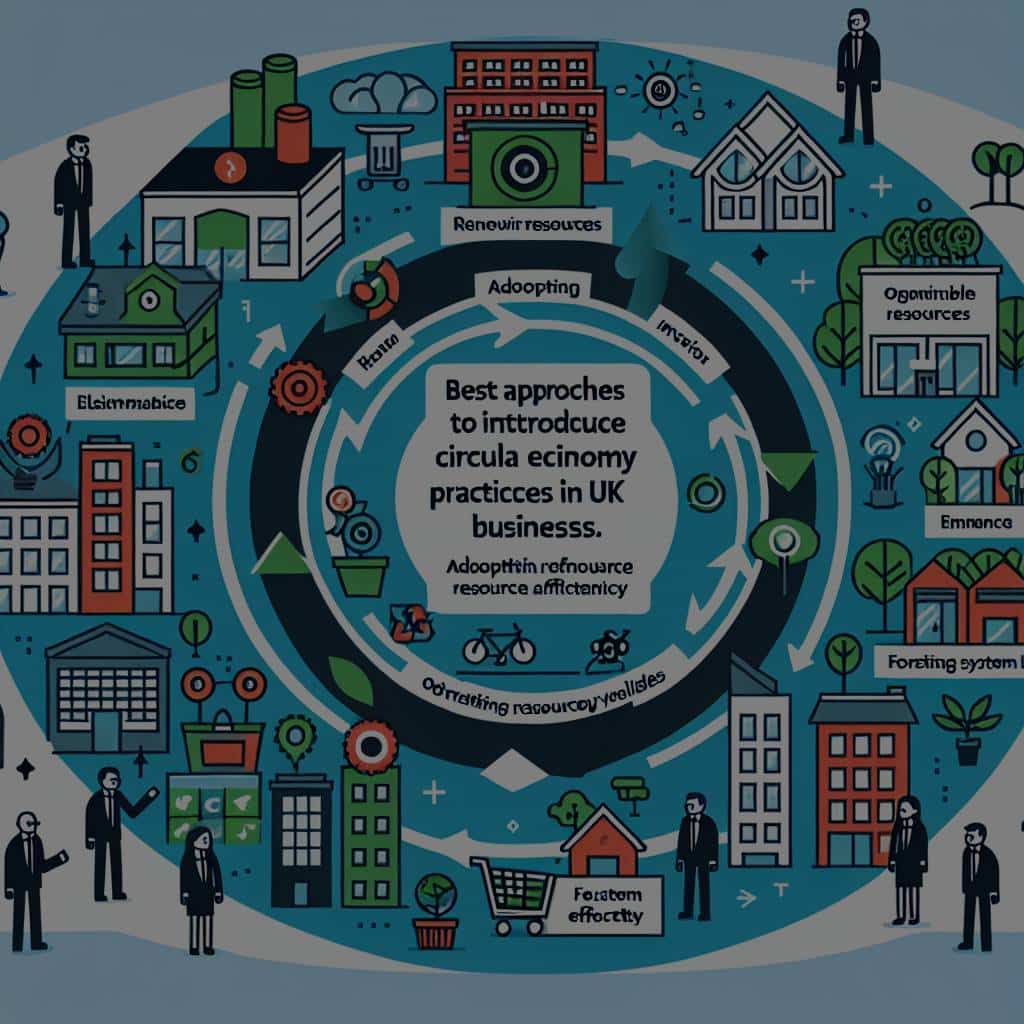What are the best approaches to introduce circular economy practices in UK businesses?

As you continue to navigate the business arena, the term ‘circular economy’ has likely become more familiar. This economic approach, which revolves around the principle of "waste not, want not," promotes sustainability and efficient resource management. The idea is straightforward: instead of disposing of products and materials once we’ve used them, we reinvent them for a new purpose. It’s about shifting from the traditional linear economic model of ‘take-make-use-discard’ to a more sustainable ‘make-use-recycle’ model.
Understanding the Circular Economy
To fully grasp the concept of the circular economy, it’s essential to understand its principles. These principles are underpinned by the intention to reduce waste, promote recycling, and support a more sustainable approach to resource management. By rethinking and redesigning processes and systems, businesses can create an economic model that is regenerative, sustainable, and less damaging to our environment.
Topic to read : How to prepare and adapt UK homes for the challenges of extreme weather events?
The circular economy isn’t just about recycling. It’s a system-wide approach that includes sustainable product design, materials recovery, alternative business models, and policy interventions. It’s about closing the loop of product life cycles through greater recycling and re-use, thereby benefiting both the environment and the economy.
Incorporating Circular Economy in Business Practices
So, how can UK businesses incorporate these principles into their practices? The first step is to understand that the shift to a circular economy will necessitate a transformation in business models and operations. Traditional business practices have been largely linear – companies extract resources, produce goods, consumers use the goods, and then discard them.
Also to read : Can urban beekeeping initiatives support biodiversity in UK cities?
However, a circular approach requires businesses to rethink this process. Products should be designed for durability, reuse, and recyclability. Production processes should minimise waste and make the most of resources. Businesses should engage with customers in a way that supports the circular economy, for example, by offering leasing or repair services, instead of just selling products.
The Role of Government Policies
Government policies play a vital role in facilitating the transition to a circular economy. They can create an enabling environment for businesses to adopt circular economy practices. In the UK, the government is taking steps to support businesses in this transition. Measures include regulations that encourage resource efficiency, such as the Waste and Resources Action Programme, and financial incentives for businesses that adopt circular economy practices.
Besides, it’s worth noting that the government can also play a role in driving demand for circular products and services. For instance, public procurement policies can prioritise sustainable products, thus creating a market for these products and encouraging more businesses to produce them.
The Importance of Collaboration and Innovation
Transitioning to a circular economy isn’t something that a single business can do alone. It requires collaboration and innovation across industries, supply chains, and sectors. This could involve partnerships between businesses to create closed-loop supply chains, where waste from one business becomes the raw material for another.
Additionally, innovation in technology and business models can also drive the transition to a circular economy. For example, digital technologies can enable better tracking and management of resources throughout their lifecycle, while innovative business models such as product-as-a-service can support a shift away from a throwaway culture.
Circular Economy in the Food Sector
One sector where the circular economy has significant potential is the food sector. According to the Waste and Resources Action Programme, the UK food industry could save up to £1 billion annually by adopting circular economy practices.
This could involve a variety of measures, such as reducing food waste, using food by-products as resources in other processes, and redesigning packaging to be more sustainable. Businesses in the food sector can engage with consumers to promote waste reduction, for example, by encouraging them to buy only what they need, or offering discounts on products nearing their sell-by date.
In conclusion, implementing circular economy practices in UK businesses involve a combination of strategies, including reinventing business models, supporting policy interventions, promoting collaboration and innovation, and applying these principles across different sectors such as the food industry.
Embracing Resource Loops and Waste Reduction
Sustainable development and strong waste management are at the heart of the circular economy. An essential principle of this economic system is the idea of resource loops. This concept involves keeping resources in use for as long as possible, extracting the maximum value from them while in use, and then recovering and regenerating products and materials at the end of their service life. Essentially, the goal is to create a so-called ‘closed-loop system’ where waste and resource use are minimised and any waste that does occur is recycled and reused.
For instance, businesses can implement ‘reverse logistics’ systems to collect used products from customers and repurpose them. This could involve everything from tech companies refurbishing and reselling used gadgets, to fashion brands recycling old clothing into new items.
Achieving this requires a commitment to waste reduction and resource efficiency. According to the Ellen MacArthur Foundation, a leading advocate for the circular economy, companies can achieve substantial economic growth by ‘decoupling’ economic activity from the consumption of finite resources. This could also entail prioritising the upper tiers of the waste hierarchy – prevention, minimisation, reuse, and recycling.
The Role of Cities and Regions in the Circular Economy
While the circular economy is definitely a matter for businesses to consider, it’s also an important issue for cities and regions. The Ellen MacArthur Foundation’s report, ‘Cities and Circular Economy for Food’, highlights how food waste can be significantly reduced when cities and regions adopt a circular approach. This is important considering that according to Google Scholar, a third of all food produced in the world is wasted, contributing to climate change and economic loss.
Local authorities can create policies to encourage waste reduction and the adoption of a circular economy. They can also facilitate resource loops, helping businesses connect to form closed-loop supply chains.
For instance, in a region where there is a high concentration of food manufacturing businesses, the local authority could facilitate a system whereby food waste from these companies is collected and used to create biofuel, with the resulting by-products used as fertiliser by local farmers. Such a system would create a closed-loop of resources, with minimal waste.
Conclusion
In a world increasingly concerned with climate change and environmental impact, the shift to a circular economy represents a proactive and effective response. From the introduction of sustainable business models, policy interventions, waste management strategies, and resource efficiency, the circular economy provides a comprehensive roadmap for UK businesses seeking to reduce their environmental footprint.
Moreover, it is not just about environmental benefits. The circular economy also offers a compelling business case with significant cost savings and potential for economic growth. Whether it’s the food sector saving £1 billion annually by adopting circular economy practices as noted by the Waste and Resources Action Programme, or tech companies finding new revenue streams through the refurbishment and resale of used gadgets, the benefits are hard to ignore.
Moving forward, it is crucial that businesses, governments, cities, and regions work together to realise the full potential of the circular economy. Through collaboration and innovation, we can create a future that is not only economically prosperous but also environmentally sustainable. As we make this journey, each step brings us closer to achieving the UN’s Sustainable Development Goals, and creating a better world for future generations.
